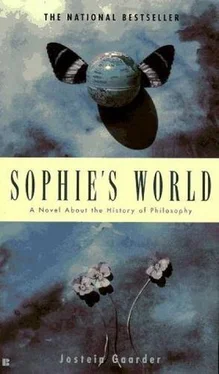Jostein Gaarder - Sophie's World - A Novel About the History of Philosophy
Здесь есть возможность читать онлайн «Jostein Gaarder - Sophie's World - A Novel About the History of Philosophy» весь текст электронной книги совершенно бесплатно (целиком полную версию без сокращений). В некоторых случаях можно слушать аудио, скачать через торрент в формате fb2 и присутствует краткое содержание. ISBN: , Издательство: BERKLEY BOOKS, NEW YORK, Жанр: Философия, на английском языке. Описание произведения, (предисловие) а так же отзывы посетителей доступны на портале библиотеки ЛибКат.
- Название:Sophie's World: A Novel About the History of Philosophy
- Автор:
- Издательство:BERKLEY BOOKS, NEW YORK
- Жанр:
- Год:неизвестен
- ISBN:0-425-15225-1
- Рейтинг книги:4 / 5. Голосов: 1
-
Избранное:Добавить в избранное
- Отзывы:
-
Ваша оценка:
- 80
- 1
- 2
- 3
- 4
- 5
Sophie's World: A Novel About the History of Philosophy: краткое содержание, описание и аннотация
Предлагаем к чтению аннотацию, описание, краткое содержание или предисловие (зависит от того, что написал сам автор книги «Sophie's World: A Novel About the History of Philosophy»). Если вы не нашли необходимую информацию о книге — напишите в комментариях, мы постараемся отыскать её.
Sophie's World: A Novel About the History of Philosophy — читать онлайн бесплатно полную книгу (весь текст) целиком
Ниже представлен текст книги, разбитый по страницам. Система сохранения места последней прочитанной страницы, позволяет с удобством читать онлайн бесплатно книгу «Sophie's World: A Novel About the History of Philosophy», без необходимости каждый раз заново искать на чём Вы остановились. Поставьте закладку, и сможете в любой момент перейти на страницу, на которой закончили чтение.
Интервал:
Закладка:
Go into your room, Sophie. Pick up something, anything, from the floor. Whatever you take, you will find that what you are holding belongs to a higher category The day you see something you are unable to classify you will get a shock. If, for example, you discover a small whatsit, and you can’t really say whether it is animal, vegetable, or mineral—I don’t think you would dare touch it.
Saying animal, vegetable, and mineral reminds me of that party game where the victim is sent outside the room, and when he comes in again he has to guess what everyone else is thinking of. Everyone has agreed to think of Fluffy, the cat, which at the moment is in the neighbor’s garden. The victim comes in and begins to guess. The others must only answer “yes” or “no.” If the victim is a good Aristotelian—and therefore no victim—the game could go pretty much as follows:
Is it concrete? (Yes!) Mineral? (No!) Is it alive? (Yes!) Vegetable? (No!) Animal? (Yes!) Is it a bird? (No!) Is it a mammal? (Yes!) Is it the whole animal? (Yes!) Is it a cat? (Yes!) Is it Fluffy? (Yeah! Laughter. . .)
So Aristotle invented that game. We ought to give Plato the credit for having invented hide-and-seek. Democritus has already been credited with having invented Lego.
Aristotle was a meticulous organizer who set out to clarify our concepts. In fact, he founded the science of Logic. He demonstrated a number of laws governing conclusions or proofs that were valid. One example will suffice. If I first establish that “all living creatures are mortal” (first premise), and then establish that “Hermes is a living creature” (second premise), I can then elegantly conclude that “Hermes is mortal.”
The example demonstrates that Aristotle’s logic was based on the correlation of terms, in this case “living creature” and “mortal.” Even though one has to admit that the above conclusion is 100% valid, we may also add that it hardly tells us anything new. We already knew that Hermes was “mortal.” (He is a “dog” and all dogs are “living creatures”—which are “mortal,” unlike the rock of Mount Everest.) Certainly we knew that, Sophie. But the relationship between classes of things is not always so obvious. From time to time it can be necessary to clarify our concepts.
For example: Is it really possible that tiny little baby mice suckle just like lambs and piglets? Mice certainly do not lay eggs. (When did I last see a mouse’s egg?) So they give birth to live young—just like pigs and sheep. But we call animals that bear live young mammals—and mammals are animals that feed on their mother’s milk. So—we got there. We had the answer inside us but we had to think it through. We forgot for the moment that mice really do suckle from their mother. Perhaps it was because we have never seen a baby mouse being suckled, for the simple reason that mice are rather shy of humans when they suckle their young.
Nature’s Scale
When Aristotle “clears up” in life, he first of all points out that everything in the natural world can be divided into two main categories. On the one hand there are nonliving things, such as stones, drops of water, or clumps of soil. These things have no potentiality for change. According to Aristotle, nonliving things can only change through external influence. Only living things have the potentiality for change.
Aristotle divides “living things” into two different categories. One comprises plants, and the other creatures. Finally, these “creatures” can also be divided into two subcategories, namely animals and humans.
You have to admit that Aristotle’s categories are clear and simple. There is a decisive difference between a living and a nonliving thing, for example a rose and a stone, just as there is a decisive difference between a plant and an animal, for example a rose and a horse. I would also claim that there definitely is a difference between a horse and a man. But what exactly does this difference consist of? Can you tell me that?
Unfortunately I do not have time to wait while you write the answer down and put it in a pink envelope with a lump of sugar, so I’ll answer myself. When Aristotle divides natural phenomena into various categories, his criterion is the object’s characteristics, or more specifically what it can do or what it does.
All living things (plants, animals, humans) have the ability to absorb nourishment, to grow, and to propagate. All “living creatures” (animals and humans) have in addition the ability to perceive the world around them and to move about. Moreover, all humans have the ability to think—or otherwise to order their perceptions into various categories and classes.
So there are in reality no sharp boundaries in the natural world. We observe a gradual transition from simple growths to more complicated plants, from simple animals to more complicated animals. At the top of this “scale” is man—who according to Aristotle lives the whole life of nature. Man grows and absorbs nourishment like plants, he has feelings and the ability to move like animals, but he also has a specific characteristic peculiar to humans, and that is the ability to think rationally.
Therefore, man has a spark of divine reason, Sophie. Yes, I did say divine. From time to time Aristotle reminds us that there must be a God who started all movement in the natural world. Therefore God must be at the very top of nature’s scale.
Aristotle imagined the movement of the stars and the planets guiding all movement on Earth. But there had to e something causing the heavenly bodies to move. Aristotle called this the “first mover,” or “God.” The “first mover” is itself at rest, but it is the “formal cause” of the movement of the heavenly bodies, and thus of all movement in nature.
Ethics
Let us go back to man, Sophie. According to Aristotle, man’s “form” comprises a soul, which has a plant-like part, an animal part, and a rational part. And now he asks: How should we live? What does it require to live a good life? His answer: Man can only achieve happiness by using all his abilities and capabilities.
Aristotle held that there are three forms of happiness. The first form of happiness is a life of pleasure and enjoyment. The second form of happiness is a life as a free and responsible citizen. The third form of happiness is a life as thinker and philosopher.
Aristotle then emphasized that all three criteria must be present at the same time for man to find happiness and fulfillment. He rejected all forms of imbalance. Had he lived today he might have said that a person who only develops his body lives a life that is just as unbalanced as someone who only uses his head. Both extremes are an expression of a warped way of life.
The same applies in human relationships, where Aristotle advocated the “Golden Mean.” We must be neither cowardly nor rash, but courageous (too little courage is cowardice, too much is rashness), neither miserly nor extravagant but liberal (not liberal enough is miserly, too liberal is extravagant). The same goes for eating. It is dangerous to eat too little, but also dangerous to eat too much. The ethics of both Plato and Aristotle contain echoes of Greek medicine: only by exercising balance and temperance will I achieve a happy or “harmonious” life.
Politics
The undesirability of cultivating extremes is also expressed in Aristotle’s view of society. He says that man is by nature a “political animal.” Without a society around us, we are not real people, he claimed. He pointed out that the family and the village satisfy our primary needs of food, warmth, marriage, and child rearing. But the highest form of human fellowship is only to be found in the state.
This leads to the question of how the state should be organized. (You remember Plato’s “philosophic state”?) Aristotle describes three good forms of constitution.
Читать дальшеИнтервал:
Закладка:
Похожие книги на «Sophie's World: A Novel About the History of Philosophy»
Представляем Вашему вниманию похожие книги на «Sophie's World: A Novel About the History of Philosophy» списком для выбора. Мы отобрали схожую по названию и смыслу литературу в надежде предоставить читателям больше вариантов отыскать новые, интересные, ещё непрочитанные произведения.
Обсуждение, отзывы о книге «Sophie's World: A Novel About the History of Philosophy» и просто собственные мнения читателей. Оставьте ваши комментарии, напишите, что Вы думаете о произведении, его смысле или главных героях. Укажите что конкретно понравилось, а что нет, и почему Вы так считаете.












